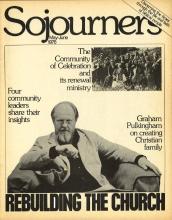There is today a tremendous ferment in the church regarding the very nature of the church itself. New questions are being raised about the place of the professional clergy, and one sign of church renewal is the revival of lay participation and leadership in the life of the church. Not only in the charismatic movement but throughout the church there is a renewed interest in the subject of the gifts of the Holy Spirit and how the Spirit works through individual members of the body to build it up and to prepare it for its ministry in the world.
Everywhere there are signs of new life bursting the old wineskins of ecclesiastical tradition. There are experimental forms of worship, small groups for Bible study, prayer, and personal sharing, informal house churches, and total spiritual-economic communities reminiscent of the communal life of the first church at Jerusalem.
What is most significant in all of this ferment, study, and experimentation is the growing realization that the church is an alternative society set up in the world to demonstrate to it the political relevance of the incarnation and passion of Jesus Christ. We are beginning to realize that the church is not merely a spiritual Band-Aid patched on a diseased world. Rather it is the place in which God has already grafted onto the world a new source of life, not merely spiritual life in the sense of the inward, pious discipline of prayer and personal purity, but life in the sense of a new people, a new political phenomenon, which holds up before the world a model for human community based on service instead of self, life instead of death, peace instead of war, and reconciliation instead of social, national, and racial alienation. It is my intent now to explore the biblical basis for this community and to delineate some of the political dimensions of the church's existence.
Read the Full Article

